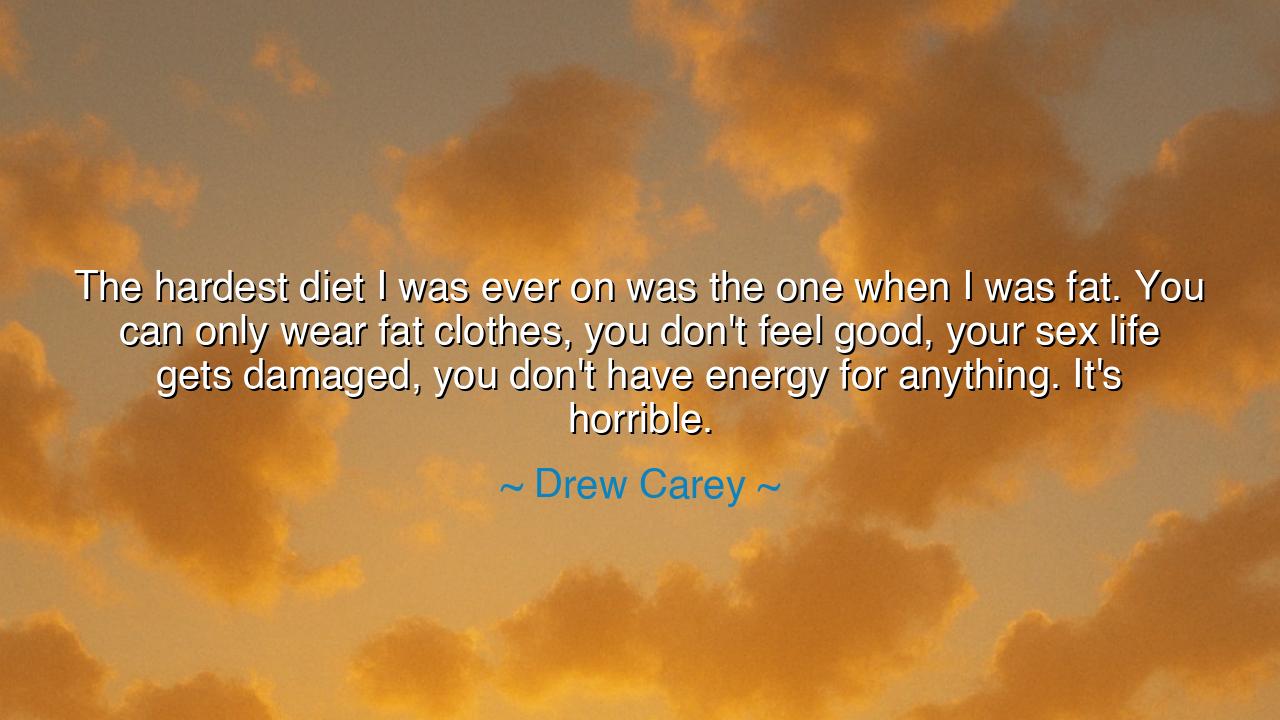
The hardest diet I was ever on was the one when I was fat. You
The hardest diet I was ever on was the one when I was fat. You can only wear fat clothes, you don't feel good, your sex life gets damaged, you don't have energy for anything. It's horrible.






In the words of Drew Carey, there lies a confession not of vanity, but of victory over a silent battle: “The hardest diet I was ever on was the one when I was fat. You can only wear fat clothes, you don’t feel good, your sex life gets damaged, you don’t have energy for anything. It’s horrible.” At first, his words may sound like lament, but beneath them breathes a deeper wisdom—an understanding that the greatest burden is not the diet we choose, but the one life imposes when we surrender our vitality. Carey speaks here not merely of food or weight, but of the heaviness of disconnection—from the body, from confidence, and from the fire of one’s own spirit.
To say that “the hardest diet” was being fat is to recognize that every neglect of the self becomes its own punishment. When we forsake care, the body rebels—not with words, but with exhaustion, ache, and apathy. The diet of despair is far more painful than any plan of discipline, for it feeds on shame and silence. Carey’s honesty cuts through illusion; he reminds us that self-neglect masquerades as comfort, yet slowly drains life of its brightness. This, too, is a kind of bondage—the slow, invisible loss of freedom to move, to breathe, to desire, to live unashamed.
The ancients understood the sacred bond between body and spirit. They knew that to care for the flesh was not vanity but reverence. The philosopher Socrates, though a man of words, believed that physical neglect was an insult to the gift of life itself. “It is a disgrace,” he said, “to grow old without seeing the beauty and strength of which your body is capable.” Carey’s reflection echoes this timeless truth: to reclaim one’s health is to reclaim one’s dignity, to awaken the body as a temple of energy and purpose. The modern world, with its comforts and distractions, tempts us toward softness and surrender. Yet, the path back to strength—though hard—is the path back to freedom.
Consider the story of Hippocrates, the father of medicine. In his teachings, he spoke not only of herbs and remedies but of balance—of exercise, food, and rest as sacred duties. He believed that illness often arose not from fate, but from the choices one made daily, in ignorance or indulgence. To live in disharmony with one’s body was, to him, the first and most dangerous diet of all. Carey’s revelation mirrors this ancient wisdom: that excess, though pleasurable for a time, leads inevitably to weariness and regret. True health, like virtue, is born not of indulgence, but of discipline guided by self-respect.
Yet, Carey’s words are not cruel or condemning. They are spoken from the soil of experience—from one who has known both struggle and awakening. His honesty is not a weapon but a torch, illuminating the truth that change begins not with shame, but with awareness. To realize that one’s condition is unbearable is the first step toward transformation. The body whispers long before it screams, and those who listen early find healing sooner. The hardest “diet,” he tells us, is not cutting calories or counting portions—it is living each day with the weight of regret, knowing you could be more, yet choosing less.
From his confession arises a universal lesson: that comfort without health becomes captivity. The sweets that please the tongue can poison the soul when taken in excess; the ease that spares us effort can, in time, steal our joy. But discipline—though it demands sacrifice—restores the body’s fire and the spirit’s pride. The true diet, then, is not one of restriction, but of renewal—a daily act of choosing life over lethargy, movement over stagnation, purpose over indulgence.
And so, let us take from Carey’s words a call to action, not of guilt, but of reclamation. Let us honor the vessel that carries us through this world. Feed it not with abundance, but with balance. Move it daily, not out of punishment, but gratitude. For the flesh and the soul are bound together; what weakens one weakens the other, and what strengthens one uplifts both.
Thus, the teaching is simple yet eternal: Neglect is the heaviest burden; discipline is the lightest freedom. To live well is to live awake—to care for the body as the guardian of the spirit within. Drew Carey’s journey is not about vanity, but victory—the triumph of awareness over apathy, of strength over stagnation. Let those who hear his words remember: the hardest diet is to live without energy, without joy, without self-respect. Choose, then, the harder path of effort today, that you may walk tomorrow with lightness, power, and peace.






AAdministratorAdministrator
Welcome, honored guests. Please leave a comment, we will respond soon